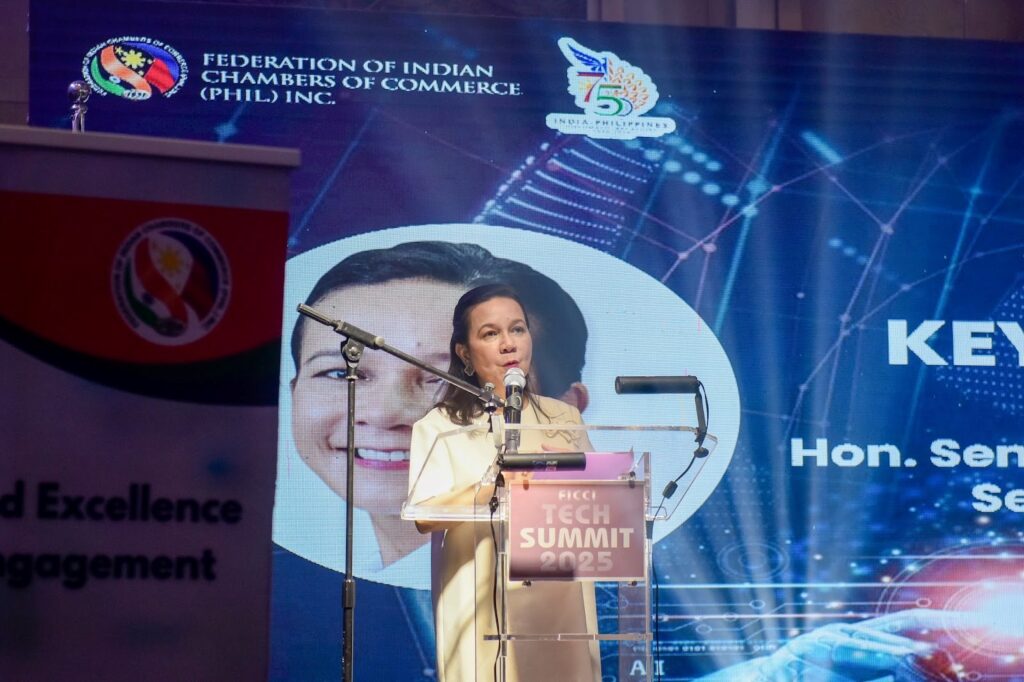|
Getting your Trinity Audio player ready...
|
A lawmaker in the Philippines is calling for a cautious and consultative approach to regulating artificial intelligence (AI) in the Philippines, underscoring the need to ensure that policies promote ethical, inclusive, and innovative use of the technology. Speaking at an event organized by the Federation of Indian Chambers of Commerce, Senator Grace Poe emphasized that while AI offers many benefits, it also introduces new risks and challenges that must be addressed through clear, carefully developed guidelines.
“I know that there are laws now that are being proposed in the Senate. It’s still pending,” Poe said. “It’s very important that we don’t just rush and pass a law without actual and proper consultation.”
Poe warned against over-regulating a technology that is still evolving. “Technology, especially new ones, has a lot of nuances that should not be over-regulated and stifled,” she explained.
While advocating for regulatory oversight, Poe also recognized the wide-ranging applications of AI in everyday life. “But definitely AI has to be somewhat regulated because, for example, we know that they use AI now to impersonate people and to scam people. But we also use AI in research and many other ways by which we are able to improve our lives. So all of these considerations have to be balanced before we can pass a law that can address AI,” she said.

The need for inclusive and ethical systems
Poe’s statements come amid increased efforts by the Philippine government to formalize a national AI strategy supported by the National Innovation Council’s agenda through 2032. The senator’s remarks align with ongoing government initiatives to develop an innovation roadmap targeting improved global competitiveness by 2028.
AI has become increasingly embedded in local industries, public services, and academic research. According to international assessments, such as the 2025 UNCTAD Technology and Innovation Report, the Philippines is among a group of developing countries outperforming expectations in AI readiness. Despite its modest income level, the country ranks high in digital infrastructure, human capital development, and industry participation in frontier technologies.
Poe acknowledged the promise of AI to spur development but noted that its rollout must be rooted in transparency, inclusion, and public trust.
Recognizing the Indian-Filipino community’s role
During her remarks, Poe also extended her appreciation to the Indian-Filipino community for contributing to the country’s economic and social development. She cited successful partnerships between Indian and Filipino businesses as evidence of shared commitment to progress.
“We have also seen that many Indians are natural entrepreneurs. They create jobs and, of course, they’re a peace-loving group here in our country,” Poe said. “We need to continue to encourage more of them to come in and invest here, especially with the passage of the Public Service Act.”Poe highlighted the collaboration between Megawide, a Filipino firm, and GMR, an Indian infrastructure company, which led the development of the Cebu-Mactan International Airport—now considered a model for public-private partnerships in the region.
Public Service Act opens door to foreign investment
Poe, who previously chaired the Senate Committee on Public Services, played a key role in steering the passage of Republic Act No. 11659. The law amended the decades-old Public Service Act and opened up key sectors—including telecommunications and transportation—to greater foreign participation.
“We believe that opening up the economy to more players will encourage competition which will spur efficiency and give consumers better choices,” Poe said.
The revised law aims to attract more foreign direct investment (FDI) by clarifying which industries are classified as public services versus public utilities. Under the new framework, foreign investors can now own up to 100% of companies in liberalized sectors, provided that national security concerns are addressed.
“With these policies in place, it is hoped that more Indian enterprises will make the Philippines an investment destination of choice,” she added.
In order for artificial intelligence (AI) to work right within the law and thrive in the face of growing challenges, it needs to integrate an enterprise blockchain system that ensures data input quality and ownership—allowing it to keep data safe while also guaranteeing the immutability of data. Check out CoinGeek’s coverage on this emerging tech to learn more why Enterprise blockchain will be the backbone of AI.
Watch | The Philippines startup boom: Highlights from Sinigang Valley Build Startup Festival

 02-18-2026
02-18-2026 




